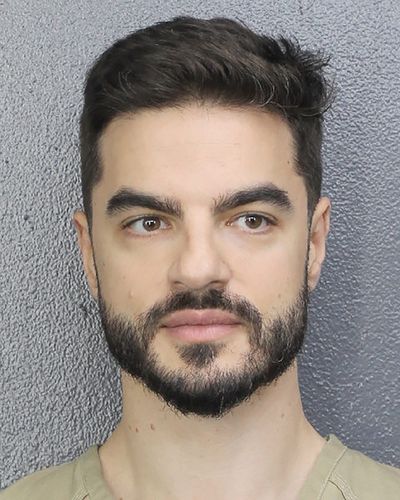FBI using kidnap charge to detain husband while investigating Florida woman’s disappearance as murder, defense argues

FORT LAUDERDALE, Fla. – Attorneys for the husband of a Fort Lauderdale woman who disappeared in Spain are again asking a judge to reconsider the decision to keep him in prison in a motion filed Tuesday, arguing that officials arrested David Knezevich on kidnapping charges only to keep him detained while they investigate his wife’s disappearance as a murder.
FBI agents arrested Knezevich at the Miami International Airport in May, months after his wife, Ana Henao Knezevich, suspiciously disappeared in Madrid in February. Last month, a magistrate judge ruled to keep David Knezevich imprisoned because he is a flight risk. Since then, he has assembled a team of high-powered lawyers prepared to defend him in a trial that could begin as soon as July.
Following a hearing Tuesday, Knezevich’s defense team filed a motion asking the judge who originally denied his release to reverse the decision based on new evidence.
“At least some of the things he relied on in making his order to detain David, we don’t believe are true,” said Jayne Weintraub, Knezevich’s lead attorney.
The motion is largely based on a series of 66 FBI reports that detail the government’s investigation and to which defense attorneys did not previously have access.
“First, (the reports) contain new information that contradicts the allegations in the complaint and indictment,” the motion states. “Second, they contain additional information that makes clear the Court has no jurisdiction over this alleged kidnapping.
“Third, they contain information that makes clear, beyond any doubt, that the government is simply using this alleged kidnapping charge as a means of detaining Defendant while it conducts a massive international murder investigation.”
The motion says that each FBI report, including documents with dates as recent as last week, describes the crime as “Foreign Murder of a U.S. National by a U.S. National,” not kidnapping. But the contents of the remaining evidence are unknown. Weintraub declined to provide any details to the South Florida Sun Sentinel Tuesday, and the reports were not included in her motion.
Investigators do not have a body, making it difficult to charge Knezevich with murder, though they have been conducting a search for possible remains in fields and waterways. They also have not pointed to a weapon or other evidence of a murder taking place in court filings. Blood was found in the apartment, but the results were pending as of May and remain unknown.
Ana Knezevich’s family “is devastated by this entire situation,” Courtney Caprio, an attorney for the family, said Wednesday. But the idea that her disappearance is being investigated as murder is not surprising.
“The family remains committed to American judicial process,” Caprio said. “Again, they’re realistic, and Ana obviously would be in touch with them if she were alive.”
Though they do not have clear evidence of a murder, prosecutors do have surveillance footage that they say shows Knezevich in Madrid – when he was purportedly in Serbia – buying duct tape and spray-paint, and using it to black out security cameras at Ana Knezevich’s apartment. They have strange text messages sent from her phone, identical to ones David Knezevich asked another woman to help him craft in Spanish. And they have footage of what appears to be Knezevich leaving her apartment in his helmet, carrying a suitcase.The two were on the cusp of filing for divorce, and Ana Knezevich had told her friends she was afraid of her husband, according to prosecutors.
Ultimately, Chief Magistrate Judge Edwin Torres had decided that Knezevich should remain detained despite the evidence being “circumstantial” because of Knezevich’s ability to flee. Prosecutors had pointed to his ties to foreign countries, particularly Serbia, where he has citizenship as well as his assets; in the last several months, he had sold several million-dollar properties.
Defense attorneys wrote Tuesday that David Knezevich’s assets are tied up in second mortgages and a conservatorship Ana Knezevich’s family had opened, therefore not readily accessible.
“Simply stated, Defendant does not have access to significant amounts of money,” the defense motion said.
Attorneys for Ana Knezevich’s family have disagreed with this claim, arguing that David Knezevich is misrepresenting his “substantial assets.”
“We believe again that David Knezevich is a flight risk and that the court will make the right decision to keep him in custody pending criminal trial,” Caprio said.
The defense motion also pointed to inconsistencies between prosecutors’ court filings, such as with the time stamps of certain key moments in surveillance footage.
Finally, defense attorneys cited previous statements made by Torres, who described the decision to keep Knezevich detained as a “close call” and agreed that the evidence is circumstantial and the case defensible. They hope the new evidence may tip the scales in favor of releasing him.
“Defendant submits that ‘close calls’ should be resolved in favor of releasing a defendant before trial,” attorneys wrote.
Judge Kathleen Williams has already set a trial date of July 29 at 9 a.m., though it can be pushed back depending on what conflicts arise. Knezevich’s defense is arguing that the case should not be tried in the United States when the allleged crime occurred in Spain.
Knezevich’s trial team will consist of three attorneys: Jayne Weintraub of Sale & Weintraub, Christopher Cavallo of Nelson Mullins, and Bruce Zimet.
Spokespeople for the FBI and the U.S. Attorney’s Office declined to comment on the allegations made by the defense Wednesday.
Knezevich’s new detention hearing has been set for July 2.